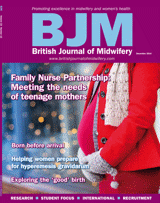References
Should alcohol abuse in pregnancy entail criminal liability?

A case being heard in the Court of Appeal has raised the vexed issue of whether a pregnant woman could be held criminally liable if her actions damage her unborn child. The case concerns a woman who, despite warnings from health professionals and social workers, continued to drink excessive amounts of alcohol while pregnant. Her daughter, now aged 7 and in local authority care, was born with fetal alcohol syndrome.
The local authority brought the case to see whether it could recover money on behalf of the girl from the Criminal Injuries Compensation (CIC) Authority. To succeed, it must show that a criminal act has been committed, and they are claiming that excessive alcohol use is a crime under the Offences Against the Person Act 1861. Section 23 of this Act relates to ‘maliciously administering … any poison or other destructive or noxious thing’, which then endangers life or inflicts ‘grievous bodily harm’. The senior lawyer for the authority told the court of appeal:
Register now to continue reading
Thank you for visiting British Journal of Midwifery and reading some of our peer-reviewed resources for midwives. To read more, please register today. You’ll enjoy the following great benefits:
What's included
-
Limited access to our clinical or professional articles
-
New content and clinical newsletter updates each month

